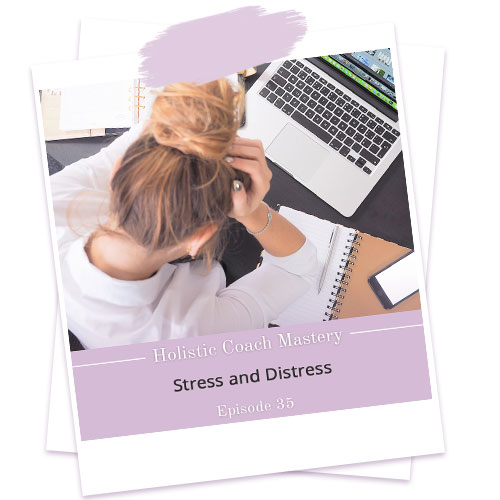
In this episode we talk about the difference between stress and distress. You will understand how your body is supposed to release the stress and why you shouldn't be afraid of that. We also explore the huge impact of distress, how to recognize it and why it's so important to address it.
Listen to the show
Subscribe:
You will learn
- Why stress isn't something bad
- Which are the most distressful situations
- How to handle with distress
Resources
Hello, dear friend, In this episode we are going to talk about stress and the stress. Stress is a word which nowadays seems to sound really negative. And it's almost like you know, it's something really bad. Everyone is talking about, you know how stress can affect your life and how you should release that. But I think that it's important to make the difference. What does stress actually mean? And what is the distress, because the truth is that stress on its own is actually something, we need something which is necessary. This is a response to a challenging situation. And it's not a problem. If you are in stress, that's not the problem. Because when you're in a stressful situation, there is eventually some kind of end, it's for a particular amount of time, and then it's over. And when it's over, there is a release. So stress is actually something we are adapted to something we are used to something that we can handle with, it's not the problem. The problem is when it becomes consistent, and there is an end, there is no release. That's what's called distress. And that's what actually the real problem, stress on its own. It's just a normal phase of life. Especially if you're an active person, if you are pursuing different things, if you live in a more dynamic environment, it's absolutely normal for you to feel stressed part of the time. But again, that's so important that at certain point, there is a release, there is an end over, you are not constantly living in this situation, because if you are, then that's becoming this stress, and this should not be tolerated, you should not live in this stress. It's very interesting to explore nature, animals and their responses. I'm always referring to the actual surrounding environment. in astrology, I like to explore what's happening astronomically with the planet, and to translate that into our interpretation. And in the energy healing work. We can also find interesting examples from nature. And what I want to share with you is what happens when an animal is under severe stress. For example, let's say that an antelope has been chased by a lion. So that's like, you know, as stressful as it can get like a real threat for the life of the animal. If the animal is lucky enough to escape, after the stressful situation is over, so for whatever reason, the lion is gone, the antelope has survived, then the antelope caves in gets into a phase of releasing the stress. And the way it looks like is shaking, the animal literally starts to shake for a couple of minutes. And through that, all the tension and the stress is released from the body system. And then the antelope is happily moving ahead, going on with her moving on with her life. And as much as you know, it may sound strange. That's how physiology works. And that's also how human bodies are wired as well. We need to release externally on a body level, the stress after the stress is over. I want to share with you something personal years ago, I believe that was the first psychotherapy session. I had a very intense one. I believe it was more than two hour long. I had lots of things To talk about and explore. So it was really, really intense, and also helpful. And after I got got back home, even though it was actually the middle of summer, and it was really hot, I started shaking, I was almost feeling like, you know, I'm cold, like, I need the blanket. And it's almost like you're about to have a fever. So literally, my body was trembling, it was shaking. And it was, you know, not as intense, like, the antelope is, you know, like, literally, you know, shaking. But it was kind of similar with me. And it lasted a little longer. I mean, for the whole evening, I felt those, you know, strange sensations in my body, the trembling, the, all of those energies were shifting. And at that point, I'm not sure if I really knew what's happening. But now I definitely do. That was a sign that I have released a huge part of the stress and the other issues that I have been through. So that's very, very interesting. Stress needs to be released through the body as well. Nowadays, especially in our Western culture, we tend to focus too much on the mind on the brain. And of course, that's so important. But we tend to forget that we have bodies and everything that we go through emotionally, mentally, spiritually, it's also programmed in the physical body. And through the body, we can also release tension and stress. That's one major reason, by the way, why exercise is so helpful, even for our mental and emotional health. Because through all the sweating and the movement, we release a lot of energy. And literally, you know, we are doing kind of like the trembling part without actually the tremble. And this really, really helps Also, our mind and our emotions. So stress needs to be released. And stress on its own is not something bad, because it's kind of like, in some kind of form, you know, it's kind of like you have some actual ending face, which allows you to release the tension in certain way. The real problem is when the stress becomes chronic, and it's called a distress. That's the really serious situation that we need to address. So this is the case when we are in constant stress. Usually, one of the main situations that may trigger the stress is if the family or home environment is very uncertain, or if there is violence, or something, you know, really dramatic in the home and family environment, because that's the place where we are normally supposed to feel safe. Even if you have stress at work, when you go back home, this is your private space. This is the place where you shouldn't feel stressed. So that's why in the unfortunate cases, when we do feel something negative in our family environment, very often in it can turn into distress, because and I'm not talking about having occasional fights with your family members. That's really normal. So we shouldn't, you know, like, be too extreme and you know, expect that everything should be extremely calm 100% of the time, absolutely not. So occasional fights or arguments in especially in an intelligent way without physical violence and it's more about like clarifying what you want. That's all normal. That's not a problem. But if the environment is violent, if a child or even a grown up feels threatened in the family environment, very often it turns into distress. Because there is no release. That's a permanent situation. And that happens at the place where you are supposed to feel safe. Those are real issues. Of course, distress may also happen at the work environment as well. Even though we might be able to handle that a little easier than the family, the stress. But yeah, career distress may also have a very negative impact. If you know that, you will be in this situation like for eight hours or more each day, it might become too much for the nervous system as well. So it's important to understand that we shouldn't be afraid of stress, it's almost like being afraid of challenges. Challenges are inevitable. That's what the human life is, if you want to achieve something, if you want to grow, if you want to move forward, stress will be part of your life. And that's not a problem. But we need to learn to release the tension, we need to learn to take good care of ourselves, to find healthy ways to do the shaking part. If you know what I mean, like whether this would be through physical exercise, or energy work, or having a consultation with a practitioner that will help you in this direction, you may find your own way. But this is very important for our mental health. And the situations of distress should definitely be addressed should not be tolerated. And it is true that those situations are not easy. And another thing I want to add here is that even if you have been in distress in the past, and you are no longer in that right now, you may still need to address the past distress. Because chances are, it hasn't been released yet, from the nervous system, the body hasn't processed that energetically. It may still keep you. So that's especially relevant to people who have had problematic childhood who hasn't felt safe. Or if there has been violence, abuse, the awful things, that's usually a sign of distress. So that should be addressed, even if it's no longer. And hopefully it's no longer part of your life. It still affects you if you haven't worked with that. And of course, if currently, you feel like you're living in this stress, this should be a number one priority for you to change the situation. Because at certain point, it will affect your emotions, your mind, even your body and your physical health. So that should not be tolerated. This stress isn't something that we should live with. And again, the most important is self care. Finding ways to release the tension, the stress, so it doesn't turn into the stress and making radical changes when that's necessary. You may need to change something about your working process. Sometimes you may need to find another job. But don't neglect the fact or the situations which bring you this stress. And I'm pretty sure that you will find some amazing transformations and new opportunities if you really make the decision not to live in distress. Again, stress is not such a problem. But stress turning into something permanent without the release. That's the problem called the stress. So I hope this was helpful. I hope that you will take care of yourself and I will catch you next time.

